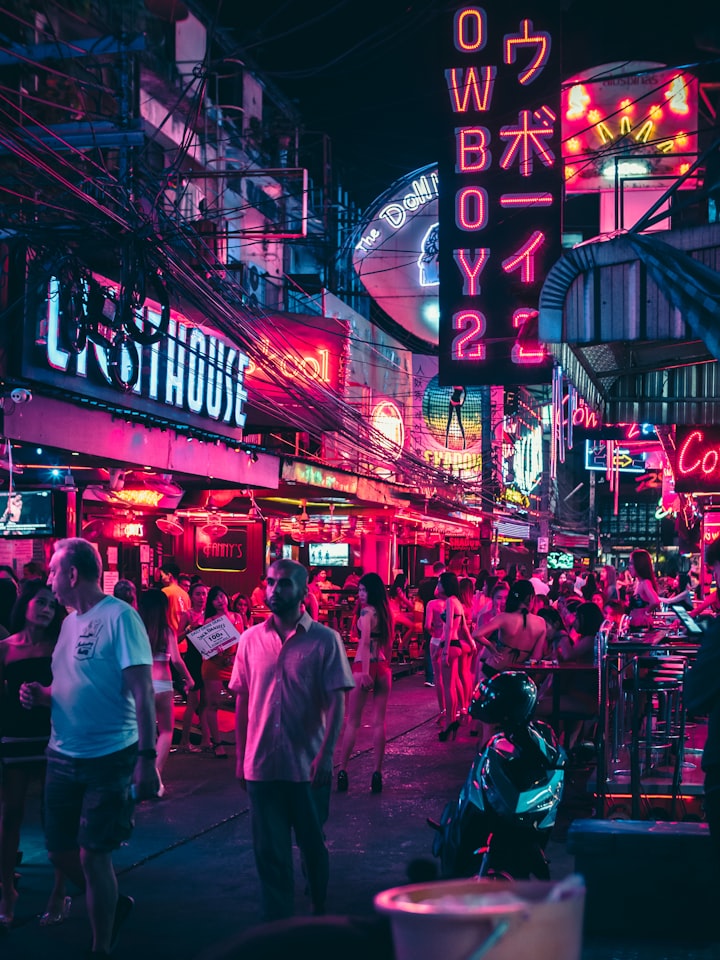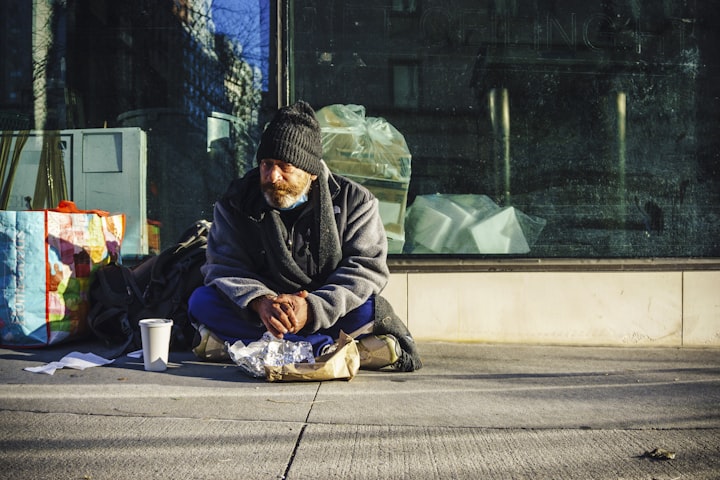What I Learned About Homelessness
The short memoir of a former scooter runner

When my original contract at the company I currently work for ended, I found myself needing a part time job while I was finishing the Data Analytics and Visualization boot camp at UT. I knocked around for a couple days, and found myself standing in a wool coat on the freezing cold floor of a warehouse on Koenig Lane. It was January. Rain hammered the building. I kept my hands shoved in my pockets to keep from shivering as the manager, my manager, gave myself and another applicant the run down of our positions. We were on-boarded almost immediately and started the next week.
I didn't want to be there. I didn't want that job. I'm five feet tall, and I weighed less than 100 pounds (still do). The scooters weighed about 20 pounds, and they weighed 40 when the new batteries were introduced. It was still frigidly cold in the mornings. Our job was to deploy newly-charged scooters at their positions in the morning, and pick up the scooters for charging at night. Each van was tasked with bringing in 100 - 150 scooters a night and deploying that many in the morning. I was expected to lift up to 50 of them a day on my own. I knew I had to be rid of that job before the summer.
But I kept the job for eight months despite the debilitating exhaustion and two hernias that I didn't know about until a year later. I liked my coworkers, and I began to know Austin like the back of my hand.
I joke with my husband that I used to run this town.

"Slow down, Ace," he says when I take the scenic route down Cesar Chavez Street towards South Lamar, lamenting the days when I drove a cube van through those streets in the dead of night, getting to know the neighborhoods, the cool breezes and quiet solitude of the sleeping city on the night shift. He laughed that Run DMC plays when I get out of the car.
Our thoughts turn to more somber memories of those days as we pass the homeless camp under Highway 71 at Manchaca, and I remember that at the heart of this beautiful city that I came to think of as mine has a rotten center that we built, that we maintain with our ignorance, and that we criminalize in our cruelty: that of our homeless neighbors.
The Nightshift

I worked days picking up straggler scooters until the boot camp ended in July 2019. In the midsummer heat, my driving partner and I had the South Downtown section. Our beat was Rainy Street up to 8th from the West side of I-35 over to South Lamar. I had that section on heavy rotation because the high traffic and cramped streets meant we were not expected to pick up as many scooters, hinting at the sensitivity my manager possessed not to punish me for my size.
By ten o'clock, the car traffic in Austin gets pushed out of downtown and the barricades go up. From Red River to San Jacinto between 4th and 7th Streets, you can only travel through downtown on foot, or by scooter. For the 6th Street scooter pickup, we parked the van up at 7th and San Jac and walked down to the chaos, heading east along 6th. Our job was to pick up any scooters still left in the area from the morning's deployment.
It's about this time that our city's homeless start to bed down for the night.
As I made my way through, crossing congested intersections and maneuvering scooters through crowds, I tried to avoid the spaces between the big potted plants at the street corners at the crossways. They were shrouded in shadow. 6th Street is always lit with a Mardi Gras brilliance, but the intersecting streets are not always, especially at the building sides. On either side of 6th Street, people made their temporary homes. I remember looking down at a homeless person, curled up on a blanket, ignoring the crowds, exhausted and dirty from the day. Some of them wore work clothes and slept on the trash bags that held their belongings. Some had sleeping bags. I remember finding some of their sleeping arrangements to be rather sophisticated. With the neck of a scooter in each hand, I walked past a man sleeping curled up around his dog, the two of them packing it in for the night, content to be ignored as the party raged around them.

As these people got ready for bed, hurried tourists and night trawlers rushed by without a second thought, eager to get to the bars, dressed for whatever occasion they were attending. St. Patrick's Day was particularly crazy. The streets were thronging. Music blasted from open bar doors. People clad in green--or men and women naked from the waist up and painted green--walked with open containers that mounted officers ignored. I remember stepping around a barricade on another run that night. I stopped beside the lamp post. Across the way, a disheveled woman sleepily hauled a mattress out from an alleyway and threw it down between a tree and a street barricade. On my way back with the scooters, I watched her tucking her two very small children in on the filthy mattress. I noticed that the sheets were clean, probably kept in a bag. I remember the little ones were blond, and one of them was sucking their thumb. I thought it was an odd choice, but I remembered that the barricade promised shelter from people walking by. The woman must have chosen that spot to prevent people from stepping on her kids. I was careful around the barricades from that point forward.
One couple liked to stay up late and play guitar at San Jac. I tossed what little change I had into the guitar case. The girl with the dreadlocks complimented my tattoos. They had a little black and white boxer mix on a leash between them. It rested peacefully and smiled at me from its blanket, content and far from suffering. Its owners were a pleasant couple, and I wished I could stay to talk to them.
I don't remember ever being afraid of a homeless person during those shifts. I remember being relieved that officers paid them no mind as long as they were quiet and didn't bother anyone. I tried to make sure I didn't bother them when I walked by.
The Festival

Our job at the SXSW musical festival, world-famous venue for bands and film, was to walk scooters out from inside the barricades. Scooters were banned from the downtown area inside of the barricades. From 8th Street to 4th Street between Red River and San Jac (not too terribly different from our nightshift beat), no scooters. The problem was we also couldn't have our vans. If you've ever walked up Colorado street to 8th, you understand the workout that is. Now drag two scooters along with you.
My station was 6th and Neches, though the temp runners dropped like flies after the first week and my beat was soon extended to Red River and Trinity at 6th. Our ARCH homeless shelter sits at 7th and Neches, so less than a block behind me was one of the highest concentrations of homeless persons in the downtown area. The ARCH shelter consists of the shelter itself and an adjacent building where folks can shower and get clean clothes. A concession store at the corner offered cheap cups of coffee and bottled water.
I arrived at 7:00am every day of the festival. Two weeks of Hell. Still, I liked arriving that early. No one was up yet, and the traffic into downtown wasn't too bad yet. It was not the golden glory of trundling down that same block at 6:00am picking up stragglers after a deployment, but it was still quiet, and sometimes coated in fog that cavorted in roving clouds through the back alleys, but could not obscure the pervading layer of grime that slicks the sidewalks and brick walls of West Sixth.
A general uptick in activity started as I made myself comfortable on the sandbags stacked up on the sidewalk beside the barricades. The city police wouldn't be out to move them into the street until 10:00am. The shelter would begin to stir around 7:30 or 8:00. Every morning before I got there, the city would power wash the sidewalks and walls, washing away the previous day's offal and bird poop. One morning they were either running late, or those unfortunates laying out on the sidewalks in front of the shelter were sleeping in. I watched them spray a power washer the size of a fire hose into the crowd, scattering the half-asleep, fumbling, disoriented people over the block.
Throughout the rest of my days as a watcher at the edge of the action, I noticed the same five or six people taking the block. The city ordinance that decriminalized loitering wouldn't come for another year, so it was still true that those not fortunate enough to grab a spot by the shelter were forced to wander. They took scooters with dead batteries so that the brake would release, and rode them around the block, though not at speed and not easily. Some lucky few had bikes to ride around on. It was a roving, hollering, yet somehow organized, city block of madness that had nothing to do with the raucous mess on just beyond the barricade.

I had to trek up to the shelter several times a day to commandeer the scooters, though I was prudent to wait until they had been abandoned. I wasn't about to confront someone who was using the devices to stay mobile on to keep from getting arrested. Eventually it got too difficult to ride the scooter, or they got tired of it. I remember stepping up to one at the stairs of the shelter. It was surrounded by a knot of bodies sitting, squatting, or sleeping on the terracotta tiles. I couldn't help but notice with a sinking heart that the majority of those bodies were people of color, some of them badly ill.
"Can I take this?" I asked an elderly woman. She was wheel-chair bound and clearly missing teeth. She waved at it in aggravation.
"Go on, now, hon," she said, "Get 'em outta here. I hate these damn things."
You and me both, Grandmother.
Sadly, but as one might expect and should be prepared for, it wasn't all pleasantries those two weeks. I was harassed for money; I was followed; I was propositioned for sex; I was screamed at incoherently; I was cussed when I would not give someone any money though it was clear I had food and coffee. With the influx of tourists, there was a boldness that was not typical of the homeless I was used to speaking to on the morning shift. I had not seen any of these faces before. I was reassured some time later that the festival brought all sorts into downtown that were not local.
And yet I felt I was safer on that street corner than most other places in town. Like the camps underneath the Highway 71 bridge, the people staying at 7th and Neches were mostly the displaced, people with no where to go and no income, and with no physical address, no way to receive social security and Medicare or Medicaid. There were people with amputated limbs, pregnant girls, people with schizophrenia or dementia, people who belonged in hospitals on clean cots. These people, the majority of them having done nothing so very wrong as age out of the workforce or become too ill to support themselves, were simply there to hit up a few tourists for cigarettes money and not get arrested.

I became a staple on that corner, and the people that surrounded me became familiar faces. It became clear to me that our homeless problem is not just a problem for those who have aged out of society, or who are substance abusers; our town's homeless situation is multifaceted and far too big for what my friend calls a mere "transfusion of money".
Who Are Austin's Homeless?
Working as a scooter runner took me all over this city. I saw the poverty of others in a unique light, in that I was not much further above them. The only thing separating me from the impoverished on our streets was the yellow vest and keys to the cube van. I was wearing hand-me-down shoes that made my feet hurt. I wore holes into my pants and sweaters. I remember walking into the Fairmont hotel to use the restroom, filthy from the morning deployment in the same clothes I'd worn the night before. I remember being surprised that I wasn't stopped and escorted out.
I learned from walking these streets that Austin's homeless are a mix, like you might find anywhere else. We have gutter punks and ramblers, substance addicts and those that are mentally handicapped to the point of needing meds, or hospitalization, and who have made it out onto the streets because they have no one to care for them, or they have family, but those people don't care.
I learned pets are a big part of homeless existence. They offer comfort and companionship to otherwise hopeless and lonely people. I've seen many of our homeless neighbors wasting away to starvation, but their pets border on fat. They care for the animals better than they care for themselves. I'm torn between fearing for the animal and my compassion for their owners situations.
Our homeless seem to be disproportionately people of color, though I admit I lack the numbers and have not done any ETL on raw data sufficient to dashboard in a way that doesn't contain bias. They seem to be disproportionately elderly. They seem to be disproportionately ill.
Our homeless are without a doubt suffering from substance abuse. In this city, meth and heroine are cheap and spreads like wildfire. You can watch the usuals standing on the corner at William Cannon and I-35 and day by day observe the slow degeneration into a synthetic illness.
Not all human trafficking is into the sex trade, though it certainly cannot be denied that if you go missing in Texas, you are on average 48 hours away from being sold into either slavery or the illegal sex trade. In the midst of the usual reasons for homelessness, I-35 is a corridor of human trafficking. It is not uncommon to see very young adults, or even teenagers, panhandling for drug money or being forced to beg. They return to their handlers frequently so that they can give up their cut, or else be brutally beaten.
They come and go out of incarceration, often for retail theft: food, water, blankets, clothes. I once met a boy who had defaulted on his student loans. He had been a licensed nurse, but whether by accident or on purpose, he had fallen into addiction, and he had no where to turn. He'd been arrested several times for retail theft, which was ruining his chances of gaining employment, since he was now a convicted felon. I always gave him what I could when I saw him. I haven't seen him in a while.
I remember a couple sitting next to the overpass at Braker and I-35. They were not elderly, but definitely older. The woman coughed violently into her jacket. The man handed her sips from a tall 40oz from across the street. I remember asking myself if their children, if they had any, knew where they were.
Austin's homeless camps are not just overflowing with addicts. I've seen mothers with children, displaced teenagers, healthy working adults in meticulously clean clothes, all clustered under overpasses and bridges in a makeshift city within a city, tents and tarps draped over rebar and debris to create shelter. They freeze in the winter and swelter in the summer.

I wish I had the numbers. I wish I could put names to the problems, and then take them into our city council and force them to share the anxiety, hunger, and exposure that our homeless neighbors live on a daily basis.
And What Are Some Systemic Problems That Create Homelessness?
Poverty in this city is criminalized in a number of ways, any of which can lead to homelessness, and for whom a meager $315 a month is the only safety net between the citizen and streets. One wrong move, one missed payment, one serious illness could cost us a roof over our heads.
First of all, Social Security is designed to be accessed by the middle class. My late friend Joel Fuhr was unable to treat his lung cancer for five years due to being homeless (albeit this was in Washington state). When he did finally get old enough to draw social security, it was almost too late, and the process was debilitated because he didn't have a permanent address and it was difficult to acquire a social worker who would advocate for his care. Yes, you qualify if you're homeless. Good luck finding anyone to help you.
Texas is a single sticker state. That means your car has to be inspected before it can be registered. Though the car doesn't have to be in the best repair, it has to be in good enough repair to meet the Travis County emissions standards, which are some of the strictest in the state. This is damaging to the working class because if your car--which you need to get to work, to get your kids to school--can't pass inspection, you can't register it. A ticket for an expired registration is $181 plus the $20 fine for each offense. It costs $18 to get the car inspected, which you pay even if it fails, and then $75 for a year's registration. This compounds year over year if you haven't been able to register the car for a while. This is not designed to protect the environment, but constitutes a tax on the poor that is also applied to any homeless person who is living out of their car. If you lose your car or driver's license due to excessive tickets, you could also lose your job, since Texas is also a right-to-work state and as long as the employer can prove they didn't violate Title VII, you can be fired for excessive absences or tardies for lack of reliable transportation. Remember that most Austinites are only $315 a month away from having zero income to pay for extra expenses such as a registration ticket and fine. We also have an untenable public transport situation, in that it's almost non-existent.
There are almost no protections for renters in Texas. The TAA leases we sign at apartment complexes are designed to protect property owners, not renters. We have a three-day grace period to pay rent, which is due on the first of every month. Because the majority of working class are hourly, payroll is often staggered. You can start work one week and not be paid at all for the first pay period. You'll find your checks are paid in arears, which is why you'll have a paycheck a whole pay period after employment ends. This can make it incredibly difficult to pay bills, especially rent, which has to be paid regardless of when your first paycheck hits. In Austin, you can be evicted for calling the police too often in a domestic violence situation. It might be federally illegal, but landlords are adept at finding ways to justify the eviction, and good luck being able to afford a lawyer in a state that actively suppresses women's right and the rights of victims.

Our LGBTQ+ are still deeply stigmatized, even in the liberal haven of the ATX. In Texas, of the 110,000 homeless youth, 17,000 are LGBTQ+. In addition to the systemic marginalization of the LGBTQ+ community, our Planned Parenthood access has been gutted. We have only two Planned Parenthood locations that are open for business. Not only does this hamper the ability to care for women's reproductive rights, it reduces accessibility to basic reproductive care for the homeless and underprivileged seeking screening and testing for everything from cancer to STDs. Our homeless LGTBQ+ go without routine screenings for HPV, endometriosis, and other reproductive and sexual health conditions.
Some years ago, the number of beds at our homeless shelters were drastically reduced (trying to find some stats on that. Gets overshadowed by how the homeless were treated during the ice storm in February). We have two real shelters, the ARCH and the Salvation Army, both of which are at capacity. The city has refused to open another one in South Austin despite the numerous homeless camps that are making residentials uncomfortable. Coupled with a repeal of the camping ordinance, and the too-little-too-late rent assistance programs we have, our homeless situation has gone from unmanageable to impossible to contain. City council is searching for a more immediate resolution to homelessness. They would like to pursue retrofitting motels instead.
Concessions
One thing I will say is thank goodness for our SNAP program. We can keep our food stamps when we score part-time employment if we prove we are still looking for full-time employment. It doesn't take as much effort as it does to stay on the able-bodied program, but I haven't seen those restrictions since before the pandemic, and we've been on the SNAP program since the beginning of 2021. It has drastically helped us make ends meet in months where we have been a few hundred dollars short. And I'm in a skilled position at a tech company! We also have the MAP program, and for women, Healthy Texas Woman that is designed to help low-income people manage health care basics without insurance. I've had to be on it twice. My husband is on that program now.
What Do We Do?
Homeless camps pop up as a result of the refusal of our city to build more shelters, with residents citing crime and influx of more homeless, as if just by not offering them a shelter means they don't exist. They are out there. They do exist. They come to the shelters. If we had more of them, they would not have to camp. Though we have two very well-known and dangerous camping spaces in Austin, the majority of them could safely be disbanded and their residents moved to more tenable, safe, and equitable housing.
Texas wasn't always a one sticker state. We could go back to that to reduce the expenses of the lower classes for maintaining a vehicle, which, despite Title VII protections, is required off the record for employment.
Decriminalization of hard drugs and the legalization of marijuana would drastically reduce our Veterans' dependencies on expensive pills to manage pain and PTSD.
Most importantly, we need to change our minds. We need to accept that being poor or homeless is not always a personal failing, a criminal state as a result of some reckless act. Our homeless are mentally ill, substance addicts, and sometimes just people down on their luck. When we change our minds about how we view poverty and the poor, we will be able to provide the support the impoverished need to change their situations. Yes, people will always be happy to abuse the system. They are not our priority. Our priority should be the greater support of the community for the betterment of our city. Once we embrace the idea that homelessness is a human health crisis and not a crime, we will be able to change the systems that contribute to it.
You can read more about homelessness here. Austinites, you can also check into ways you can help end homelessness in the ATX here at Caritas of Austin.

About the Creator
Ashley McGee
Austin, TX | GrimDark, Fantasy, Horror, Western, and nonfiction | Amazon affiliate and Vocal Ambassador | Tips and hearts appreciated! | Want to see more from me? Consider dropping me a pledge! | RIP Jason David Frank!
Reader insights
Outstanding
Excellent work. Looking forward to reading more!
Top insights
Easy to read and follow
Well-structured & engaging content
Expert insights and opinions
Arguments were carefully researched and presented
Heartfelt and relatable
The story invoked strong personal emotions
On-point and relevant
Writing reflected the title & theme






Comments
There are no comments for this story
Be the first to respond and start the conversation.